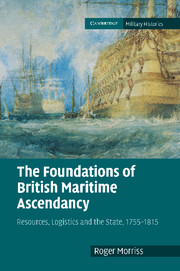Book contents
- Frontmatter
- Contents
- List of tables
- Preface
- Glossary of British weights, measures, casks and money values
- List of abbreviations
- Introduction
- 1 The British state in evolution
- 2 Defence and expansion
- 3 Economy and finance
- 4 Naval growth and infrastructure
- 5 Ordnance and technology
- 6 Manpower and motivation
- 7 Foodstuffs and victualling
- 8 Shipping and transportation
- 9 The supply of land forces overseas
- Conclusion
- Bibliography
- Index
Introduction
Published online by Cambridge University Press: 10 January 2011
- Frontmatter
- Contents
- List of tables
- Preface
- Glossary of British weights, measures, casks and money values
- List of abbreviations
- Introduction
- 1 The British state in evolution
- 2 Defence and expansion
- 3 Economy and finance
- 4 Naval growth and infrastructure
- 5 Ordnance and technology
- 6 Manpower and motivation
- 7 Foodstuffs and victualling
- 8 Shipping and transportation
- 9 The supply of land forces overseas
- Conclusion
- Bibliography
- Index
Summary
Until the twentieth century, Britain's maritime history – then largely naval history – was written to inspire pride and emulation in its readers. It has given rise to a triumphal view of the expansion of Britain's maritime empire, naval power and economic wealth, the heroes of which have been statesmen, military officers and gentlemen capitalists. This largely class-bound history has fostered an understanding of Britain's status in the maritime world that has tended to ignore, indeed disdain, clerical skills, labour, transportation and supply. After all, these were the work of working men and servants. Almost at the bottom of a hierarchy of explanation for Britain's maritime ascendancy has been bureaucracy. Throughout British history the back-room bureaucrats have often been scapegoats for the blame of its military leaders. The consequence has been disregard for, if not deliberate derision of, the organisation which has always been necessary to ventures beyond Britain's shores.
This book turns this scale of values on its head. It attaches great importance to the bureaucratic culture which evolved under the aegis of the state during the eighteenth century. By ‘culture’ here is meant simply a way of thinking and performing tasks – in this case, ones necessary to the state. Naturally, both were shaped by historical legacy and by public opinion, which in Britain had a particular capacity for influence through the political structure of the state. Often overlooked, but fundamental to these environmental influences, was Britain's maritime nature.
- Type
- Chapter
- Information
- The Foundations of British Maritime AscendancyResources, Logistics and the State, 1755–1815, pp. 1 - 6Publisher: Cambridge University PressPrint publication year: 2010

